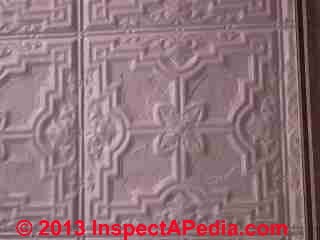 Aluminum or Tin Ceilings
Aluminum or Tin Ceilings
Pressed tin or embossed tin or aluminum ceilings history, troubleshooting, replacements
- POST a QUESTION or COMMENT about embossed or pressed tin ceilings or aluminum ceilings
Pressed tin ceilings:
This article describes tin ceilings, embossed metal ceilings or ceiling panels made of tin or aluminum.
We describe the history, properties and diagnosis or repair of pressed tin or aluminum ceiling panels: where damage appears, the effects of rust, lead paint hazards, and the sources of modern replacements for tin ceilings in both nail-up panels and suspended ceiling panels of embossed metal. We also compare tin ceilings to embossed linocrusta ceiling coverings.
InspectAPedia tolerates no conflicts of interest. We have no relationship with advertisers, products, or services discussed at this website.
- Daniel Friedman, Publisher/Editor/Author - See WHO ARE WE?
Aluminum & Pressed Tin Metal Ceilings - Properties, Photos
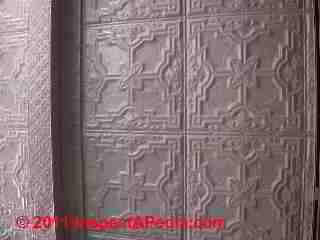
Metal ceilings were typically tin and most often were installed in kitchens, during the late 1800s and early 1900s.
1885: beginning in Brooklyn tin or aluminum ceilings were popularized in North America, replacing ornate plaster work or used to cover cracked, damaged plaster ceilings. Aluminum ceiling tiles & panels were also produced at about the same time as pressed tin.
"Tin ceilings, consisting of painted, embossed tin plate panels are almost uniquely North American, although they were introduced into Australia and South Africa in the late 19th century."[13][15]
Their design was often a decorative square pattern intended to simulate ornate plaster ceilings.
This was a fairly durable ceiling system and in some areas has become fashionable again. The metal is normally painted.
The metal ceiling in our photo (above left) is an antique metal ceiling installed in a New York City restaurant.
You can see in the left of the photo that a wooden beam was also wrapped in decorative embossed metal.
Types of Damage to Pressed Tin Ceilings & Embossed Aluminum Panel ceilings
This pressed tin metal ceiling photograph shows a typical example of metal ceiling components that are rusting through from leaks above.
Watch out: when we observe a rusted area such as that shown in the metal ceiling panel above we expect the extent of damage to be larger than what is immediately visible.
That's because the panel is usually rusting from its upper or hidden side. In cases of a small leak that does not immediately drip through the ceiling, rust may develop for a time before it is apparent on the room side.
Pressed aluminum panel ceilings are more resistant to rust damage and perforation but can also corrode through.
Reader Question: evaluating water damage to a molded tin ceiling
Can you take a look at the photos attached and tell me in your opinion Is this lead paint peeling due to a water loss?
A water pipe broke directly above this ceiling And the water ran down onto it for over three hours. It is a pressed tin ceiling covered with a lead based paint.
Would you say the paint is peeling as opposed to cracking? Will the tin now rust without the paint covering since it has been exposed to the water?
Thank you in advance for your time and consideration. J.N. 11/23/2013
Reply: comments on water damaged pressed-tin ceiling: lead paint, asbestos, electrical wiring hazards
A competent onsite inspection by an expert usually finds additional clues that would permit a more accurate, complete, and authoritative answer than we can give by email alone.
For example, an onsite expert might find other places where water traveled and has damaged the building, and s/he might find other evidence of the history of building leaks that tell us where to look for conditions that merit further investigation or repair.
Presuming you are correct about the presence of lead based paint and by observation this is an old building which, over its life, is likely to have endured a variety of conditions of leaks, moisture or humidity, and other events that affect its condition.
That said I offer these comments interspersed with your original questions. I observe a dropped ceiling that was installed below the original pressed or molded metal ceiling; often a lower ceiling was installed to cover an original ceiling in poor condition; another reason for the lowered ceiling in some buildings was to reduce the heating load or to add insulation - though your photos of the ceiling cavity didn't show any add-on insulation there.
Is this lead paint peeling due to a water loss? A water pipe broke directly above this ceiling And the water ran down onto it for over three hours.
Yes that seems very likely, particularly since the separation of paint from the pressed tin ceiling looks recent; the metal surface where paint has come away looks rather shiny. If the paint had peeled years ago I'd expect most of those large suspended pieces to have fallen off and I'd expect to see oxidized if not bare rusted metal surfaces.
It is a pressed tin ceiling covered with a lead based paint.
Which means cleanup has to follow lead paint abatement hazards to minimize health risks to workers and occupants.
Would you say the paint is peeling as opposed to cracking?
Certainly this is peeling paint; cracking paint is generally still adhered to its surface but has shrunken (or the surface expanded) to show cracks in the painted surface.
Will the tin now rust without the paint covering since it has been exposed to the water?
Depending on the alloy it will oxidize, and if it's simple pressed steel it will most likely rust.
Watch out: I also noticed in passing that there is improper and unsafe electrical wiring - splices outside of an electrical box hanging from this ceiling; I'd be alert for other amateur electrical work that needs correction.
And depending on its age, the acoustical ceiling tiles that were affixed to the drop ceiling below the original tin ceiling may contain asbestos. As a cleanup and preservation of the original ceiling would require demolition of that material you'll want to be alert for and properly handle a possible asbestos hazard.
See ASBESTOS CEILING TILE IDENTIFICATION
Finally, if this ceiling space were being used as a return air plenum (not observed in your photos) you'd not want to leave this lead paint debris in place in the air path, as that would also be a likely hazard to building occupants. Keep us posted on how you proceed - what we learn may assist others.
Also see PAINT FAILURE DICTIONARY
The preceding exchange began with a discussion of water damage to a pressed tin ceiling and continues
at FLOOD REPAIR CONTRACTORS with a discussion on working with the insurance company and contractor involved in drying out a building following water damage.
Plastic glue-on Embossed Backsplash, Ceiling, or Wall Tiles & Panels
Several companies (listed below) produce alternative products to the traditional pressed tin or aluminum ceiling and wall panels, including products made of fiberglass or thermoplastic.
Here are two images of a glue-on thermoplastic backsplash product distributed by ACP.
Pressed or Embossed Tin or Aluminum Ceiling Look-Alikes, Repairs, Replacements & Alternatives: Suspended Ceiling panels & Lincrusta Panels
Don't be fooled. Linocrusta (or Lincrusta) ceilings are also an embossed covering product but the material is leatherette or paper-based, not metal.
As we explain at LINOLEUM & SHEET FLOORING Descendents of Linoleum include Anaglypta and Lincrusta (many writers spell it "Linocrusta or linacrusta or lincrusta", an embossed patterned covering used on walls and ceilings.
Details about Anaglypta & Lincrusta ceilings are at LINCRUSTA CEILINGS & WALLS
Photo at left: Lincrusta in Byzantine pattern - Wikipedia 11/25/2013
Buy / Repair, Restore Pressed Tin or Embossed Aluminum Ceilings & Suspended Ceiling Panels & Wall Coverings
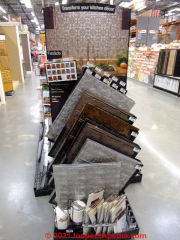 Photo at left: pressed tin panels or substitute materials in aluminum, fiberglass, plastic, are sold for use on ceilings, walls, and as kitchen backsplash coverings. At left is a store display of kitchen backsplash panels at H.G. Page Lumber, Route 55, Poughkeepsie, NY. This backsplash product is produced by ACP
Photo at left: pressed tin panels or substitute materials in aluminum, fiberglass, plastic, are sold for use on ceilings, walls, and as kitchen backsplash coverings. At left is a store display of kitchen backsplash panels at H.G. Page Lumber, Route 55, Poughkeepsie, NY. This backsplash product is produced by ACP
- ACP, PO Box 1581, Appleton WI 54192, website acpideas.com, Tel: 800-558-0615. Glue-on "decorative thermoplastic panels" and tiles installed with polyurethane construction adhesive.
- American Tin Ceilings, 1825 60th PL E., Bradenton, FL 34203, Tel: 866.852.8035, Email: sales@americantinceilings.com, Website: http://www.americantinceilings.com/
- Armstrong Metallaire Decorative Ceilings, Armstrong World Industries, Inc. Customer Relations and Technical Services, P.O. Box 3001, Lancaster, PA 17604, Tel: 800-233-3823, website: https://www.armstrongflooring.com/ (available through independent retailers
- Ashton Clarke Pressed Metal Designs Ontario, Canada Office 519-925-6627, Sales:647-282-8754 info@ashtonclarke.ca, Website: http://www.ashtonclarke.ca - Quoting:
Ashton Clarke Pressed Metal Panels are manufactured in lightweight, rustproof aluminum, ensuring each panel's longevity. As experienced manufacturers of reproduction metal work, Ashton Clarke is able to offer one-on-one assistance in the purchase, installation and application of each product ... - Better than Tin (Faux tin ceilings, Reproduction Ceiling Tiles In Metallic Finishes by Ceilume Smart Ceiling Tiles), Tel: 800-557-0654, Website: http://www.betterthantin.com /faux-tin-ceiling-tiles.cfm
- Brian Greer's Tin Ceilings, Walls & Unique Metal Work, 1572 Manheim Road,
RR2 Petersburg, On,
Canada, N0B 2H0, Tel: 866 846-9710 , website: http://www.tinceiling.com - Chelsea Decorative Metals (The Tin Man), Chelsea Decorative Metal Comapny, 8212 Braewick Dr., Houston TX 77074, Tel: 713-776-8661 website: http://www.thetinman.com
- Heritage Ceilings, Australian Pressed Metal, website: http://www.heritageceilings.com.au/, Tel: Within Australia: 08 9725 2206, Outside Australia: Your Australia access code + 6 18 9725 2206
- Tin Ceiling Express, P.O. Box 20666; in the U.S., 3909 WITMER ROAD, #914 Niagara Falls, NY USA 14305-1244
Huntington Station, New York 11746, Tel: (800) 570-0592, website: http://www.tinceilingxpress.com - Lincrusta, CWV limited, Morecambe, Lancashire, England, website: http://www.lincrusta.com, Tel: +44 (0) 1254 222 803. Quoting:
In addition to Lincrusta, CWV Limited also supplies wallcoverings under the world famous Anaglypta, Crown, Coloroll and Vymura brands to retailers and wholesalers internationally. - Park, Sharon C., A.I.A., PROCESS-PRINTING DECALS as a SUBSTITUTE for HAND-STENCILLED CEILING MEDALLIONS [PDF] (1990) Preservation Tech Notes, U.S. NPS, Finishes No. 1, retrieved 2022/10/10, original source: https://www.nps.gov/tps/how-to-preserve/tech-notes/Tech-Notes-Finishes01.pdf
Excerpts: Completed in 1935, the National Archives was designed by John Russell Pope and is part of the Federal Triangle of monumental buildings in Washington, D.C. (see figure I). As the repository for official Federal documents, including the Declaration of Independence and the United States Constitution, it is used daily by many visitors and researchers.
...
Twenty-two feet above the floor is an imposing oak ceiling consisting of 105 coffered sections set within five large bays, separated by boxed beams.
Decorative stencilling at the center of each coffered section consists of a 12" diameter medallion of leaves curling around a grouping of red cherries. The shading and highlighting of the painted surface creates a trompe l'oeil effect of a carved wooden feature.
...
The coffered ceiling had been badly damaged in 1962 with the installation of fluorescent light fixtures (see figure 2).
A fourth option, and the one selected, involved creating a stencil on a clear background similar to decals used in model building. This water release transfer decal would be placed directly onto the prepared plywood veneered panel.
By having a transfer decal of the medallion on a clear background, the regularity of the pattern would be less noticeable, since portions of the different oak veneered panels would be visible. Slight hand shading of the medallion during the final varnish coating of the panels could affect highlights similar to the originals. - Presssed Metal Ceilings Australia, Website: http://www.pressedmetalceilings.com.au, Tel: 07 3630 4255
- Pressed Tin Panels Pty. Ltd. ABN 43 104 063 434 22 Vale Road Bathurst NSW 2795 Australia, Tel: +61 (0) 2 6332 1738, Website: http://www.pressedtinpanels.com
- Staveteig, Kaaren R., HISTORIC DECORATIVE METAL CEILINGS & WALLS: USE, REPAIR, & REPLACEMENT [PDF] (2022) Preservation Brief 49, US National Park Service, retrieved 2022/06/30, original source: https://www.nps.gov/tps/how-to-preserve/briefs/49-decorative-metal.htm, printed in color by InspectApedia
Excerpt:
“Durable, handsome and fireproof,” it was touted as being cheaper and quicker to install than decorative plaster. It could even be used to cover deteriorated plaster.
For owners of commercial, manufacturing, and institutional buildings, these attributes made pressed- or stamped-metal ceilings quite appealing in the late 19th and early 20th centuries.
Commonly known today as “tin ceilings,” decorative metal ceilings were widely used during this era in such diverse structures as Main Street shops, offices, restaurants, and manufacturing buildings, as well as in churches, homes, stables, and even passenger ships. - Staveteig, Kaaren R., HISTORIC DECORATIVE METAL CEILINGS & WALLS: USE, REPAIR, & REPLACEMENT [PDF] COMPLETE VERSION (2017) Preservation Brief 49, US National Park Service, retrieved 2022/06/30, original source: https://www.nps.gov/tps/how-to-preserve/briefs/49-decorative-metal.htm, printed in color by InspectApedia
- W.F. Norman, Inc., 214 N. Cedar | P.O. Box 323,
Nevada, MO 64772, Tel: 800.641.4038 | 417.667.5552, Website: http://wfnorman.com, Email: info@wfnorman.com - Quoting:
Using original dies from 1898, the W.F. Norman Corp. Hi-Art® product line contains 140 ceiling design components and over 1,300 ornaments. Their growing popularity stems not only from nostalgia but from their beauty, permanence and economy.
Lightweight and easy to install, Hi-Art® products are not only an authentic way to restore buildings & homes, they are also widely used to embellish new construction projects.
...
Continue reading at LINCRUSTA CEILINGS & WALLS or select a topic from the closely-related articles below, or see the complete ARTICLE INDEX.
Or see these
Recommended Articles
- AGE of a BUILDING, HOW to DETERMINE
- CEILINGS, PLASTER, LOOSE HAZARDS
- CEILING TILES ASBESTOS CONTENT
- LINCRUSTA CEILINGS & WALLS
Suggested citation for this web page
METAL CEILINGS ALUMINUM & TIN at InspectApedia.com - online encyclopedia of building & environmental inspection, testing, diagnosis, repair, & problem prevention advice.
Or see this
INDEX to RELATED ARTICLES: ARTICLE INDEX to BUILDING INTERIORS
Or use the SEARCH BOX found below to Ask a Question or Search InspectApedia
Ask a Question or Search InspectApedia
Try the search box just below, or if you prefer, post a question or comment in the Comments box below and we will respond promptly.
Search the InspectApedia website
Note: appearance of your Comment below may be delayed: if your comment contains an image, photograph, web link, or text that looks to the software as if it might be a web link, your posting will appear after it has been approved by a moderator. Apologies for the delay.
Only one image can be added per comment but you can post as many comments, and therefore images, as you like.
You will not receive a notification when a response to your question has been posted.
Please bookmark this page to make it easy for you to check back for our response.
Comments
IF above you see "Comment Form is loading comments..." then COMMENT BOX - countable.ca / bawkbox.com IS NOT WORKING.
In any case you are welcome to send an email directly to us at InspectApedia.com at editor@inspectApedia.com
We'll reply to you directly. Please help us help you by noting, in your email, the URL of the InspectApedia page where you wanted to comment.
Citations & References
In addition to any citations in the article above, a full list is available on request.
- Wikipedia Web: https://www.wikipedia.org/ provided background information about some topics discussed at this website provided this citation is also found in the same article along with a " retrieved on" date. NOTE: because Wikipedia entries are fluid and can be amended in real time, we cite the retrieval date of Wikipedia citations and we do not assert that the information found there is necessarily authoritative. - "Lincrusta" retrieved 11/25/2013
- Yarwood, Doreen (1990) "The Domestic Interior: Technology and the Home" pp. 902-948 In McNeil, Ian (editor) (1990) Encyclopedia of the History of Technology Routledge, London, page 905, ISBN 0-415-01306-2
- Bush, Akiko (2010) "An Introduction to Modern Textiles: The Wrong Impression" Dwelling 10(5): pp. 120—126, page 122
- Campbell, Gordon (editor) (2006) "Lincrusta" The Grove Encyclopedia of Decorative Arts volume 1, Oxford University Press, New York, page 41, ISBN 0-19-518948-5
- Parsons, Ralph (1997) From Floor to Ceiling: How One Man's Inventions Brought Fame to Staines and Sunbury Spelthorne Museum, Staines, England, ISBN 0-9530265-0-7
- Our recommended books about building & mechanical systems design, inspection, problem diagnosis, and repair, and about indoor environment and IAQ testing, diagnosis, and cleanup are at the InspectAPedia Bookstore. Also see our Book Reviews - InspectAPedia.
- In addition to citations & references found in this article, see the research citations given at the end of the related articles found at our suggested
CONTINUE READING or RECOMMENDED ARTICLES.
- Carson, Dunlop & Associates Ltd., 120 Carlton Street Suite 407, Toronto ON M5A 4K2. Tel: (416) 964-9415 1-800-268-7070 Email: info@carsondunlop.com. Alan Carson is a past president of ASHI, the American Society of Home Inspectors.
Thanks to Alan Carson and Bob Dunlop, for permission for InspectAPedia to use text excerpts from The HOME REFERENCE BOOK - the Encyclopedia of Homes and to use illustrations from The ILLUSTRATED HOME .
Carson Dunlop Associates provides extensive home inspection education and report writing material. In gratitude we provide links to tsome Carson Dunlop Associates products and services.


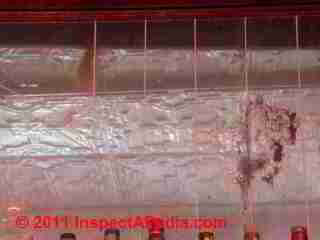

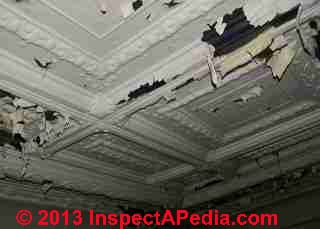

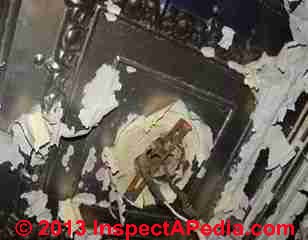
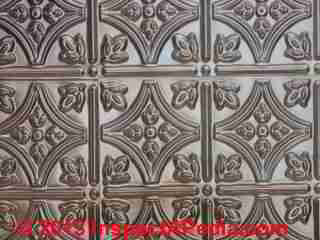
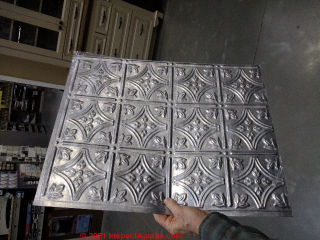
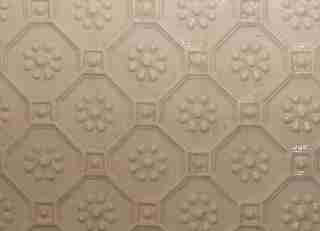
No one has commented yet. Be the first!